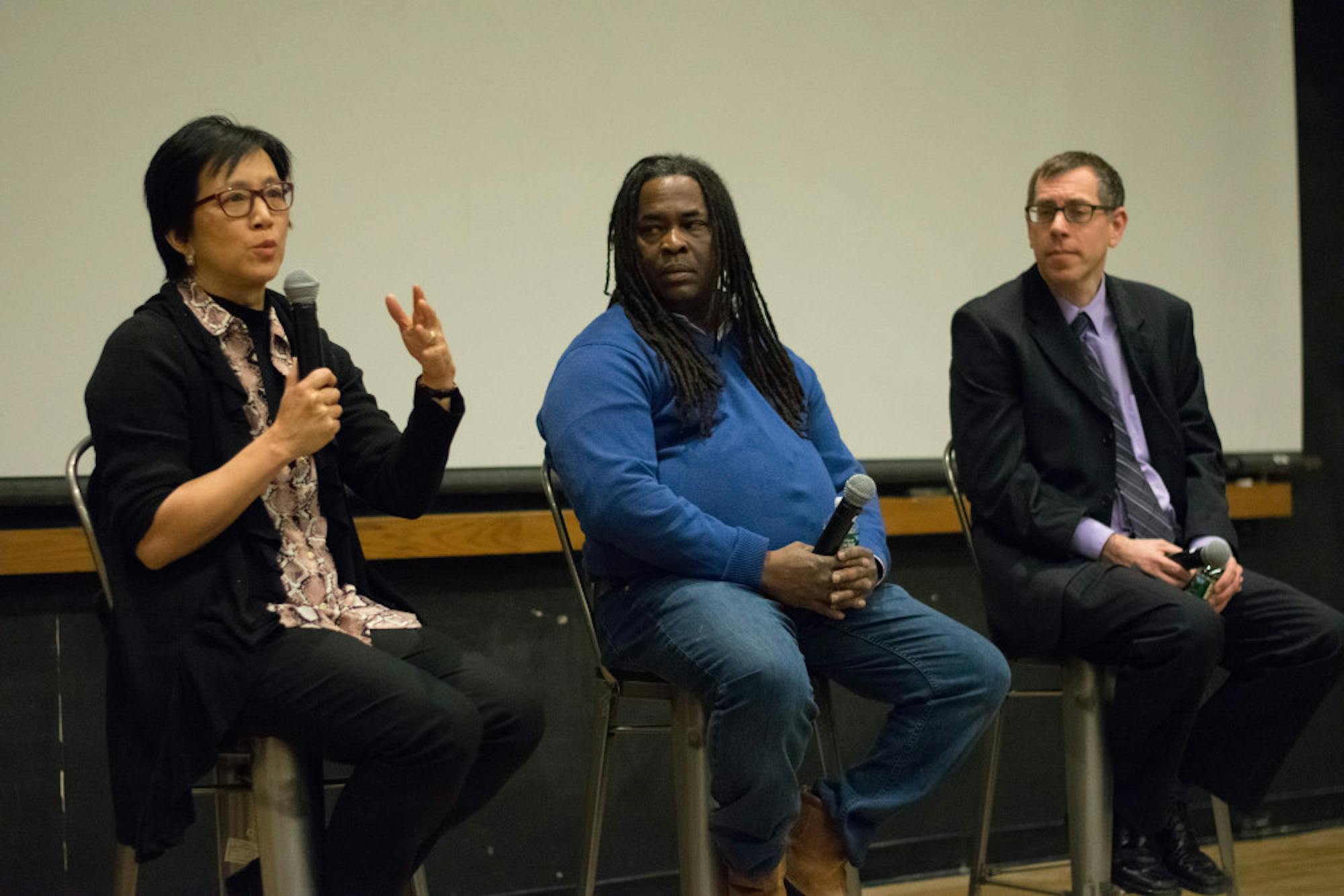Members of The Boston Globe’s Spotlight team discussed their experiences in investigative journalism last night in a panel event hosted by the Jonathan M. Tisch College of Civic Life in Barnum Hall.
Panelists Patricia Wen, Adrian Walker and Todd Wallack, all of whom reported for the Globe’s December 2017 seven-part series on racism in Boston, spoke to students and community members as a part of Tisch College’s Distinguished Speaker Series.
Alan Solomont, Pierre and Pamela Omidyar Dean of Tisch College, introduced both the panelists and moderator Julie DoBrow, Tisch College senior fellow for media and civic engagement. Solomont commended the panelists and noted the importance of media literacy as an essential component of civic life.
“The media is the people’s window into problems in our communities through which to view the decisions of our leaders and into facts that create the foundation for how we approach the world,” Solomont said. “When the truth is hidden, we rely on investigative reporters to doggedly seek it out and expose it for all to see.”
Dobrow opened the panel with a discussion of the revitalization for investigative journalism that has emerged in a media environment involving the spread of fake news and mistrust in the mainstream media.
Wallack and Walker both acknowledged the increased enthusiasm for investigative reporting as demonstrated through increased readership and financial investments in journalism.
"We’re seeing huge hunger for news and for investigative reports and for really digging deep, and it’s ironic given that we’re at a time where people talk about fake news and mistrust in the media, because we’re doing more good journalism than ever," Wallack said. "In order to distinguish ourselves, we really need to do substantial reporting."
Wen, the Spotlight team editor, referred to Wallack's point as a silver lining of the current political moment, but questioned journalists' ability to impact Americans who preach a narrative of mistrust.
"Despite lots of excellent investigative reporting going on in a lot of different publications, the segment of American society that contributes to fake news, I’m not really sure that it's actually going to make a difference to that particular contingent of society," she said.
The panelists then discussed the formation of the Spotlight team and its evolution from an idea based on a British newsroom to its current place as a hallmark feature of The Boston Globe, especially following the 2015 film portraying the team’s uncovering of sexual abuse in the Catholic Church. Wen noted that the team has grown from a group of three reporters and one editor to a group of six reporters and herself on its most recent series.
Walker described the team’s unique separation from the rest of the newsroom, which allows reporters to dive deeply into issues rather than trying to fit in an intense investigative process in between other responsibilities.
The panelists discussed the process of parsing through the tips they receive to decide what stories deserve coverage, noting that while many stories have national resonance, their primary goal is to hold institutions accountable and expose wrongdoing in the greater Boston area. Walker noted that in turn, many of the best Spotlight stories are systemic in nature.
Among the scores of tips are countless pleas for help on individual situations, Wallack added.
"Unfortunately we can’t tell every individual story," he said. "So we try to take on new issues, and we try to take on broader systemic issues and find a handful of really good examples that illustrate that broader problem and explain how that broader problem affects everyone, and hopefully bring change that helps everyone and not just one person."
Wen emphasized the powerful role that data has had in informing pieces and shaping stories, particularly in the team’s recent series on racism in Boston.
“We realized writing about race is so emotional and that it was important that if we were going to look at racism or race, we had to try to be as data-focused as possible and try to rely more on statistics than on anecdotes,” she said.
Walker noted that one of the most striking aspects of the experience was the comparison process between statistics they compiled for this process and investigations done in the 1980s.
“I was really staggered when we looked at the data how little the needle had moved in so many areas, whether it was health care or higher education or development or politics,” he said.
Wen acknowledged that the Globe's "digital-first" approach allows stories to continue to reach readers without being limited by location or time. While she said that the comment boards can inhibit fruitful conversations because of the prevalence of internet trolls, a moderated forum used for the race series demonstrated the potential for positive digital conversations surrounding controversial topics.
Conversations on Facebook also allow new user engagement with the issues than what was previously possible, Walker added.
"It's another way of keeping the series alive that you wouldn't have had 10-20 years ago," he said.
Wallack also noted the widespread potential for digital conversations, adding that some users who have met on digital forums surrounding their series have organized in-person meetings to discuss race.
Following the moderated panel, Dobrow opened the event to questions from the audience.
When asked about the evidence of change raised through their reporting, Walker emphasized powerful responses from the community as evidenced by conversations on the ground and local legislative efforts.
Wen agreed, noting that the series on race brought up important conversations for institutions to think critically about their roles within the community. She posed a challenge to think about how institutions define diversity for themselves, drawing upon the team's exposure to systematic racism within higher education in its race series.
Boston Globe's 'Spotlight' team discusses race series, investigative process

Members of the Boston Globe's Investigative unit Patty Wen, Adrian Walker and Todd Wallack speak in Barnum auditorium as a part of the Tisch College Distinguished Speaker Series on March 15, 2018.





